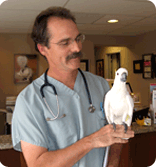Recovering Military Macaw

We are a retired couple living in Mexico for the past 8 years. Six years ago we rescued a Military Macaw that was being kept in very poor conditions. We do not know the age of the bird but we do know that she is a female (DNA sexing). Almost a year ago the macaw was attacked by a dog and received a head injury from being slammed on the floor. It seemed touch and go for awhile, but she seems to be recovering well. She has never recovered the strength in her beak that she had previously but her cooordination seems much better. On that occasion she was seen several times by a vet here who
prescribed anti-inflamatories (intramuscular and oral) As I say, she seems to be better from this incident, but for the past several months she has been scratching at her ears. We thought it was due to new feathers that were irritating and itching, but then she started with the “yawning” for lack of a better description of her actions. She looks like someone trying to clear their middle ears on an airplane. This led me to have a closer look at her ears and I found that one of the ear canals was closed and seemed to be plugged with a crusty substance. One canal was closed more than the other side as well as having this crusty substance present. I have spoken with a vet from the government wildlife rescue agency in Guadalajara and he recommended dosing her with ENROFLOXACINA which I have come to find out is a very strong antibiotic used in the avian industry. He suggested that long-term use might provoke liver damage, so I am hesitant to use it for very long. After ten days of treatment (4 drops of ENROFLOXACINA in 100 ml of water), she seems possibly somewhat better but the ear canal remains very small (not completely closed as before)with no encrustations.In all other respects she seems fine. Her feathers look great and she seems happy. Does this sound like the correct treatment for what appears to be an ear infection? Do you think that the blow to the head could have precipitated the ear infection?

Lots to talk about here, but challenges in detail are a real issue without actually physically evaluating the patient in question.
Ear infections, overall, are comparatively uncommon in parrots. It is possible that the traumatic injury could have predisposed to this problem. In reality, there is no cytologic evaluation, culture information or factual solid confirmation of the presumption of infection here. Crusty material can accumulate in the ear canals when there is inadequate vitamin A in the diet, when foreign material gets into the ear, when secondary infection gets rolling, and secondary to trauma and even clots of blood accumulating in the area.
Enrofloxacin is a very broad spectrum antibiotic. There is no long term adverse effects with this drug’s use on the liver of parrots that is known. Water-based medication with this antibiotic in macaw species has only been published in the red-shouldered macaw (ara nobilis). (J Avian Med Surg, December 200; 286-290, 19 refs). In this study, it was shown that 200 mg/liter of water was effective at maintaining plasma concentrations, which would/should only be helpful for known and susceptible bacterial infections. I do not know what concentration is being achieved at 4 drops per 100 ml of water for your bird.
What I would suggest is that your original veterinarian be asked to have a look at the bird and its ears carefully, possibly even with magnification. Retained material in the ears should be carefully removed, and possible bacterial culture samples taken from this area. At the same time, a careful oral examination is appropriate, as it is possible that the ear abnormalities are the result of more significant soft tissue trauma and skull boney damage.

































